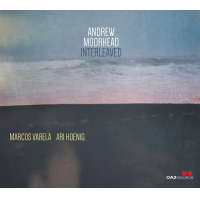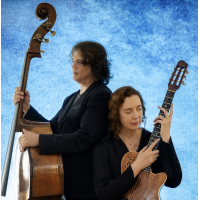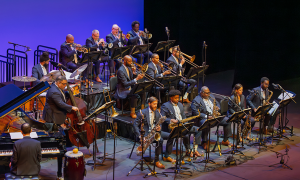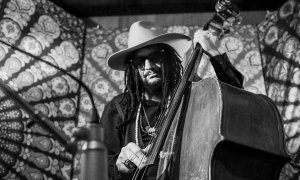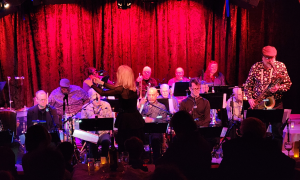Home » Jazz Articles » Live Review » The Cookers at Jazz Alley
The Cookers at Jazz Alley

Courtesy Lisa Hagen Glynn
The Cookers
Jazz Alley
Seattle, Washington
March 21, 2023
As the light rail on the One Line in Seattle rumbled towards downtown, I saw my reflection in the window as I glanced outside. That image was one of an older man, one who had seen a lot, and in the jazz world, heard a lot as well. Yet even more striking was the thought of with whom I would be spending the evening at the city's jazz mainstage, Jazz Alley. The members of the touring band, The Cookers, were my elders by some twenty years. My mind drifted towards the dozens of albums I have collected over the decades that include the members of the band both as leaders and sidemen. I remembered meeting pianist George Cables ever so briefly in 1979 in Seattle as a member of Dexter Gordon's quartet. And bassist Cecil McBee? My goodness, he was the bassist with Alice Coltrane at Carnegie Hall in 1971 when I was just 15 years old—a concert that literally changed how I thought about music. I recalled seeing trumpeter Eddie Henderson and drummer Billy Hart as members of Herbie Hancock's band in the early '70s—a band that included Seattle's own Julian Priester. My thoughts drifted to tenor saxophonist Billy Harper, and the recordings I discovered with his darting, piercing tenor explorations with Max Roach, Lee Morgan, Thad Jones and others, not to mention a two-saxophone gig in New York with altoist Sonny Fortune.
Upon entering the palatial nightspot, there was a room full of music lovers who had similar associations with the greatness that would inhabit the stage that evening. While so much of the performance would be about respect, about listening intently to our elders, the audience had to remind itself that one also must respect the present and be a willing recipient of what these great masters had to offer that very evening. They needed to prepare themselves for every note, and receive them like holy water. In that sense, the pilgrimage of all that attended would be two fold.
There would be one change, as alto saxophonist Jaleel Shaw would perform in place of Donald Harrison. As the band began to play, Cables' playing stood out, sounding as marvelous as ever. McBee played seated, his eyes closed, continuing to perfect the art of doing more with less. There was power in the band's overall sound compared to a year ago, when the band performed on the Jazz Alley stage after a pandemic-induced hiatus from touring.
Of course, there is the reality that with the exception of David Weiss and Shaw, these icons of the past 60-plus years of jazz history, who range from ages 78 to 88, are not living on a pension, but touring to make a living. That being the case, Cables, Harper, Hart, McBee and Henderson taught us in a 90-minute set that their sound, both individually and collectively, is vibrant, joyous and genuine. The quiet leadership and brilliant playing of Weiss and atmospheric altoisms of Shaw rounded out the band's sound.
Jumping out of the box with Hart's "The Call of the Wild," the drummer's aggressive playing and pure energy was a slap in the face, removing any vestige of ageism that may have crept into the respectful minds of the audience. Hart continued to push the band through McBee's "Peacemaker." Henderson's trademark tonality was on full display, with the color and richness that was lacking a year ago on the same stage. Henderson, and the band at large had now had a year back on the road and in the studio, and were remarkably headed on an upward trajectory. The look on Hart's face said it all—the music still matters, it is still holy and the stage is still a sacred place.
Shaw, a veritable youngster in this setting at 45 years old, was ablaze with spontaneous insertions that pinged back and forth between Cables' elegant comping, McBee's minimalist perfection, and Hart's pure, magnificent fire. His playing has an intelligence easily accessed by his marvelous facility. Bassist McBee's harmony was augmented by chordal assertions and melodic bursts. It was difficult not to be in awe of his mastery and legend.
Harper's "Croquet Ballet" was first recorded with Morgan in 1972. Harper introduced the 2023 version first in stating the melody and then in a long solo that displayed a sharp, biting tone, and wandering melodic phrasing much like that of fellow Morgan alumnus, Wayne Shorter. Weiss offered a dynamic solo, standing relaxed with his horn pointed downwards. Nobody on stage could stand down for even a brief second, as Hart continued to push with great intensity.
Cables' hard bop leaning "Blackfoot" put the emphasis on Hart and McBee in collective swing mode, with Cables subdividing their efforts harmonically. Cables' perfectly strung, quicksilver passages and harmonic advances set the tune in motion with a mastery that has not diminished a bit over time. Cables mentioned after the show that he was, "Doing the best with what he had." Health struggles aside, he is still one of the grand masters of jazz piano and one of the loveliest humans this music has ever produced.
It was with the interpretation of Harper's beautiful ballad, "If Only One Could See," that the house became completely disarmed. With Harper handing the piece over to Henderson, the trumpeter demonstrated on no uncertain terms why he is one of the true standard bearers for jazz trumpeters of his generation. His sound was strong, pure and focused on beauty itself. Cables' lightning-quick, light touch provided the harmonic canvas to bring out the brightest of Henderson's melodic highlights.
The performance ended with Freddie Hubbard's "The Core," with Hart leading in with masterful, bold strokes. The final tune reminded the audience that we had arrived that evening not to speak, but to listen—to learn from the wisdom of our elders. Their message would need no interpretation. The narrative would be spoken through the ebbs and flows of the highest form of artistry. It would connect us with a veritable timeline of jazz history, within the context of peerless performance in the here and now.
Tags
Live Review
The Cookers
Paul Rauch
United States
Washington
Seattle
George Cables
Dexter Gordon
cecil mcbee
Alice Coltrane
Eddie Henderson
Billy Hart
Julian Priester
billy harper
Max Roach
lee morgan
Thad Jones
Sonny Fortune
Jaleet Shaw
Donald Harrison
David Weiss
About The Cookers
Instrument: Band / ensemble / orchestra
PREVIOUS / NEXT
The Cookers Concerts
Support All About Jazz
 All About Jazz has been a pillar of jazz since 1995, championing it as an art form and, more importantly, supporting the musicians who make it. Our enduring commitment has made "AAJ" one of the most culturally important websites of its kind, read by hundreds of thousands of fans, musicians and industry figures every month.
All About Jazz has been a pillar of jazz since 1995, championing it as an art form and, more importantly, supporting the musicians who make it. Our enduring commitment has made "AAJ" one of the most culturally important websites of its kind, read by hundreds of thousands of fans, musicians and industry figures every month.




